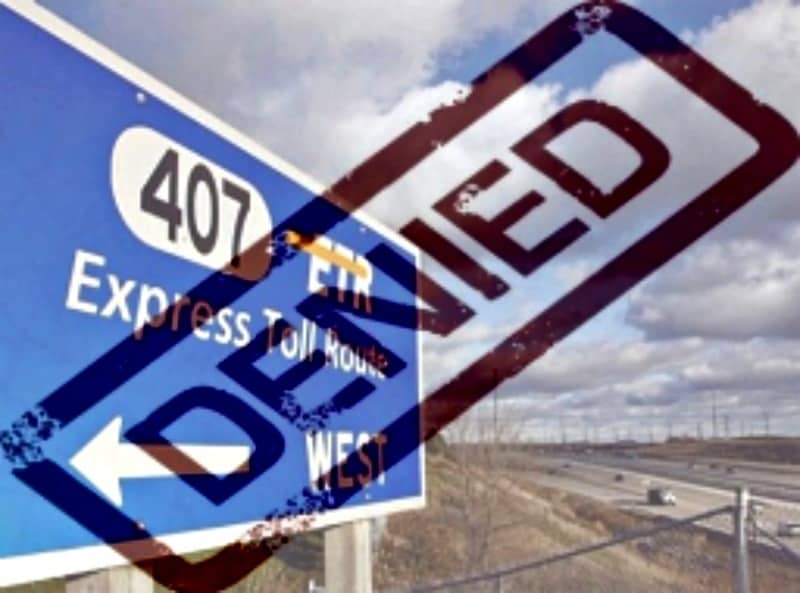 407 ETR debt settlement
407 ETR debt settlement
This 407 ETR debt settlement blog was reviewed earlier this week by Mr. Brian Empey, Partner, Goodmans LLP. We wish to express our thanks to Mr. Empey who made a valuable suggestion which we incorporated.
Thank you for reading our Brandon's Blog. Check out our AI insolvency bot on this page and don't forget to subscribe!
We have updated this blog for 2018 where 407 ETR has implemented some changes. Check out our blog 407 ETR RATES: THE ONLY 407 ETR RATES DEBT SETTLEMENT PLAN GUARANTEED TO ACTUALLY WORK for the update.
In January 2014 in our blog titled 407ETR FAIRNESS-ONTARIO COURT OF APPEAL ENSURES FRESH START we described to you the decision of the Court of Appeal for Ontario in 407 ETR Concession Company Limited v. Superintendent of Bankruptcy (In the Matter of the Bankruptcy of Matthew David Moore) (the Moore Decision).
The highway’s owners appealed that decision to the Supreme Court of Canada (SCC). On Friday, November 13, 2015, the SCC released three decisions all dealing with the same basic issue: does the federal Bankruptcy and Insolvency Act (BIA) take paramountcy over provincial laws purporting to deal with the issue of debt and bankruptcy in Canada. The SCC answer was a resounding YES!
What did the SCC decide about the provincial law about 407 debt settlement?
The SCC dismissed the appeal of the ETR. The SCC considered whether the plate denial provisions of the Highway 407 Act conflicted with the discharge provisions of the BIA. ETR’s position was that provincial law about plate denial should apply following a person’s discharge from bankruptcy. The Attorneys General for several provinces, including the Province of Ontario, advanced positions in support of the provinces’ jurisdiction to legislate in vehicle licensing.
The SCC’s decision upheld the Moore Decision which found that the discharge provisions of the BIA override the plate denial provisions of the Highway 407 Act.
What is the effect on ETR debt settlement?
The effect of the SCC’s decision is that pre-bankruptcy amounts owed to the ETR are deemed to be provable claims under the BIA and can no longer be collected through plate denial under the Highway 407 Act following a customer’s discharge from bankruptcy. Therefore, 407 etr debt settlement is possible.
Where a person has been discharged from bankruptcy and has pre-bankruptcy amounts in plate denial, which are provable claims under the BIA, 407 ETR will credit these amounts (plus interest and fees incurred on those amounts) on the person’s 407 ETR bill, upon receipt of a Notice of Bankruptcy, and an Order of Discharge or a Certificate of Discharge.
In both cases, once the amount owing is credited, then the person is free to get plate renewal from the Province.
What will 407 ETR do next?
407 ETR must and is abiding by the SCC decision. They will set up a protocol whereby those who have already been discharged from bankruptcy and have been denied a plate renewal will be able to prove they have been discharged, get the 407 ETR debt, including penalty and interest, reversed, and get a plate renewal.
Those who are still in the middle of their bankruptcy proceedings and not yet discharged will be able to apply to have a plate renewal, once they are discharged from bankruptcy and prove it to 407 ETR.
Interestingly enough, there was no evidence whatsoever in any of the Court cases, including this one before the SCC, as to the 407 ETR’s right to deny anyone credit. When you get your transponder, the 407 ETR is actually extending credit to you, in the form of use of the toll highway in return for the toll charges they expect you to pay. It is no different from the bank loaning you money, and expecting you to repay it in full, with interest.
Will 407 ETR deny extending credit to discharged bankrupts? Will they only issue a new transponder to discharged bankrupts who give them a large cash deposit so that use of the 407 ETR will only be on a “cash and carry” basis? We don’t know, they have so far been silent on the issue, but it is still early in the game.
Do you need 407 etr debt settlement and a plan for your other debts too?
Instead of going deeper into debt seek help from a professional trustee, even if you’re not considering bankruptcy at this stage. A trustee in bankruptcy will evaluate your situation and help you to arrive at the best possible solution for your problems, whether that solution is a bankruptcy alternative like credit counselling, debt consolidation or a consumer proposal or bankruptcy. With immediate action and the right plan, the Ira Smith Team can solve your financial problems Starting Over, Starting Now. We’re just a phone call away.
